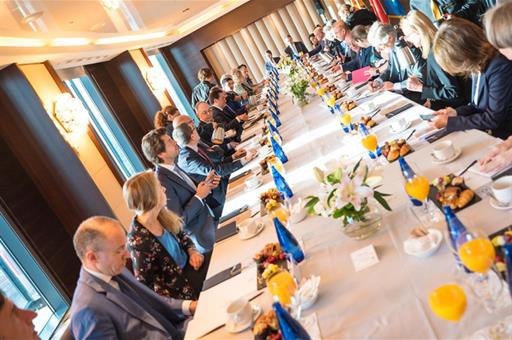Albares presents the main axes of the Spanish Presidency in 2023 to the EU's European ambassadors
News - 2022.9.12
During the meeting, organised by the Czech Republic's current presidency of the Union, the minister emphasised the Government's commitment to the European project: "We are clear: for Spaniards to do well, Europe has to do well and Spain has to do well in Europe," he said.
Before detailing the axes that will mark the six months of the Spanish Presidency, the minister recalled the difficult current context, marked by the consequences of the COVID pandemic and the unjustified Russian invasion of Ukraine. Albares stressed that the response to both crises has been that of European unity and called for its reinforcement: "We need more Europe".
In particular, referring to the Russian aggression, he recalled "the solidarity that all European countries have shown", by adopting the largest set of European sanctions to date and providing unprecedented economic support. "We have also, for the first time, provided military support financed through a European instrument".
For the foreign minister, there are two aspects in which European cooperation is key. Firstly, energy, "which requires urgent and coordinated measures to respond to the serious crisis we are going through". In this regard, he pointed to the importance of reducing energy dependence on Russia "by accelerating the development of renewables, improving energy efficiency and boosting European gas and electricity interconnections".
The second area where agreement is essential is economic governance, which will make it possible to respond to inflationary pressures on food and energy and increase public investment for green and digital transitions. The minister warned that fiscal policies should not increase inflation levels and assured that "fiscal rules at a European level need to be reformed".
Spanish Presidency: strengthening unity
Despite the volatility and complexity of the international context, Spain is working on a presidency that will strengthen the European Union "so that it is capable of continuing to respond to crises that arise and to continue institutional and legislative development that meets the expectations of Spaniards and Europeans".
The work programme, the minister detailed, will be linked to the work axes of this European Commission: green, social and digital. Albares recalled the ten main lines set out by the President of the Government of Spain, which, among other aspects, include social and territorial cohesion, reinforcement of European citizens' identity, sustainable economic growth, equality and inclusiveness and reform of decision-making methods, highlighting in particular strategic autonomy "in the areas that have the greatest impact on the daily lives of our citizens: health, food and especially energy".
The foreign affairs minister recalled that 22 informal ministerial meetings will be held in Spain, distributed geographically and in time, and an informal European Council in Granada. He also pointed to the main areas of work: review of the Recovery and Resilience Plans; the EU Social Agenda, completing the European Pillar of Social Rights and the Social Pillar Action Plan; and the EU Green Agenda, to consolidate the fight against climate change in favour of biodiversity, the reform of the energy market and the development of interconnections.
In closing, Albares signalled the opportunity to increase EU attention on two crucial regions: Latin America and the Southern Neighbourhood, with the EU-CELAC summit in Brussels and the Southern Neighbourhood ministerial meeting in Barcelona.
Non official translation





